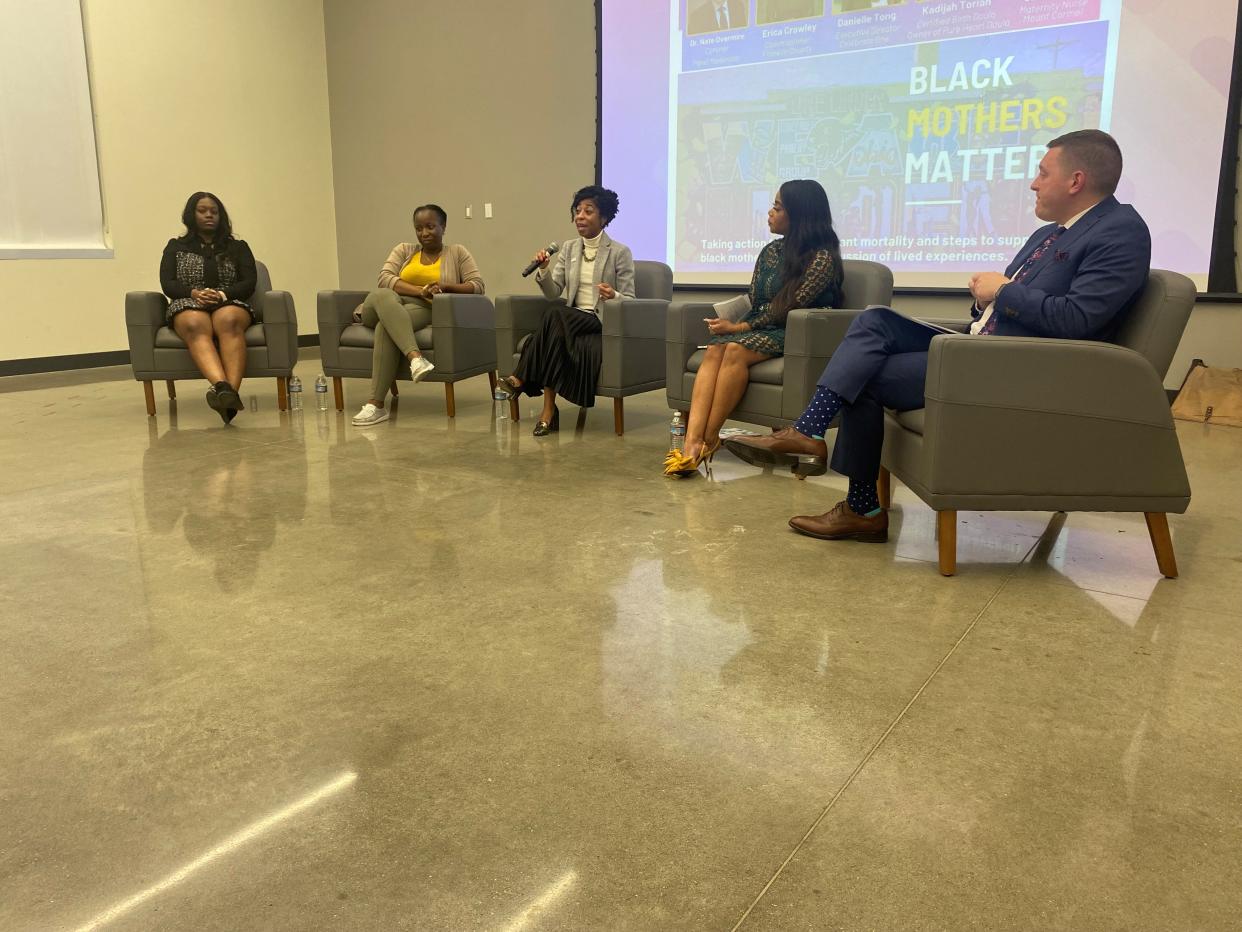'Black Mothers Matter' panel shares experiences and research on mother and infant mortality

Franklin County Commissioner Erica Crawley described her pregnancy as "traumatic."
After having to go through an emergency C-section at 34 weeks, she gave birth to twins.
But a few weeks afterward, Crawley said she started experiencing severe pain in her abdomen and drove herself to the emergency room. Doctors said she had a pocket of blood in her pelvis, told her to take some over-the-counter medication, and sent her on her way, she said.
Crawley told those gathered at a "Black Mothers Matter" panel discussion Thursday at the Linden Community Center that it wasn't until she was in her 30s that she learned that her experience was not normal.
The panel event, hosted and moderated by Franklin County Coroner Dr. Nate Overmire, featured personal stories like Crawley's as well as insights and challenges that Black women face when it comes to childbirth and motherhood. There was also discussion on how Black mothers as well as the community can move in partnership to address the disparities and reduce both Black infant and maternal mortality.
Besides Crawley, other panelists who spoke at the event were:
Danielle Tong, executive director of Celebrate One, created in November 2014 by the city of Columbus, Franklin County and numerous partner organizations with the goal of making sure each baby has "a healthy and safe first year of life that sets him or her on a path to thrive each year beyond that."
Kadijah Torian, a certified doula and founder of Pure Heart Doula. A doula is a trained, nonmedical professional who provides physical, emotional and informational support to their client before, during and for a period after childbirth.
Jatu Boikai, a maternity nurse manager at Mount Carmel Grove City.
Black women are at least three times more likely to die due to pregnancy related issues in comparison to white women, the Dispatch previously reported.
In Ohio, the Black infant mortality rate in 2021 was 164% higher for Blacks than whites, even when controlling for factors such as parental income and education, according to the Ohio Infant Mortality Report and a study by the Health Policy Institute of Ohio.
In Franklin County, 34 of the 50 infants who died in 2022 were Black, according to data from the Franklin County Coroner's Office. From 2018 to 2022, there were a total of 102 Black infant deaths.
Panelists cite bias, systemic racism in health care
Experts and researchers have long pointed to racism in the medical field and its effects on Black people and how it affects quality of care.
Boikai told the audience that it's important for people to seek out not just Black health care providers, but providers that understand the disparities that Black women face.
"The numbers don't lie. When Black women and birthing people have access to doctors and nurses who look like them, the rate of mortality decreases, sometimes by half. Infant mortality decreases by half," Crawley said.
Experts and researchers have also highlighted the importance of diversity in health care and how that can play a role in reducing the disparity in Black infant deaths.
Boikai has said she makes it a point to hire Black nurses in her role as a nurse manager.
"I hire black people because we need to be in this space," Boikai said. She added that it's important for medical professionals "to treat people like people."
Torion said she thinks that Black people "have to come to a place where we're now holding hospital systems accountable for the way that they treat us, too."
"Any work must be viewed through a racial equity lens", Crawley said.
'Plan your village'
While the panelists offered critique on medical providers on how to improve health outcomes for Black women and Black mothers, they also offered insight on how Black women can take stock of their own resources and become their own advocates. The panelists also acknowledged that the onus cannot entirely be on them and agreed that there shouldn't be "tips and tricks" on how to get through the system alive.
Torian told the audience that expecting mothers should always review hospital statistics on births and disparities in infant deaths. She emphasized the need to "plan your village" of support and build it early, while also mentally and physically preparing for the journey.
"When it comes to the risks, understanding those risks and asking the right questions and advocating for yourself — and having somebody who can advocate for you — is huge," Boikai said.
Crawley encouraged women to listen to their bodies and speak up when they feel something is wrong.
In a call to action, Boikai asked the audience that they be willing to support Black mothers in the community and to be willing to call out racism and discrimination when they come across it.
@ShahidMeighan
smeighan@dispatch.com
This article originally appeared on The Columbus Dispatch: Black women panel shares experiences and research to support mothers
